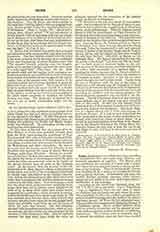

Crime, IMPEDIMENT OF, nullifies marriage according to ecclesiastical law, and arises from adultery and homicide separately or together. The Roman civil law prohibited the marriage of a man with a widow with whom he had committed adultery during the life-time of her busband. There is serious doubt (Deere-turn, Gratiani, Pt. II, c. xxxi, q. 4 1) whether the Church ever accepted this law. Ecclesiastical law since the twelfth century certainly supposes other circumstances in such adultery in order that it may effect a nullification of the marriage.
According to the actual law (Decretal. Greg. IX, Lib. 4 X tit. 7: De eo qui duxit. Cap. i, Propositum—Cap. vi, Significasti) there are two cases in which an adulterer may not marry one with whom the crime was committed: (I) When the adulterer promises to the partner in guilt marriage after the death of the other’s legitimate spouse; (2) When the two attempted marriage and this was consummated during the lifetime of a legitimate spouse. Hence neither adultery alone without promise of marriage nor the promise of marriage without adultery forms a diriznent, or nullifying, impediment. The promise must be accepted, and if it precede the adultery, must not have been recalled before the sin. Silence alone is not sufficient evidence of the acceptance of the promise. The adultery to which the promise is attached must be formal and known by both. If Titus should corrupt a woman who believed him to be free, he could marry her after his wife’s death, even if he attempted marriage with her during his wife’s life, provided she were unaware of his marriage.
Affected ignorance, certainly, and, most probably, crass ignorance does not excuse from the sin or its penalties. The adultery must be consummated, but it is not required that the promise united to the sin should be absolute, nor, most probably, that it should be sincere, because the impediment does not depend upon the value of the promise, which is essentially null, and because a fictitious promise, if apparently true, is naturally inductive to the sin; and this the Church, by establishing such an impediment, strives to prevent as far as possible. In regard to the impediment, it is indifferent whether the promise precede or follow the adultery, if both occur during the marriage. If the promise were made during the life of a first spouse, and the adultery were committed during the life of a second, the impediment would be doubtful. It is well to note that a promise of two persons to marry after the death of a legitimate spouse is recognized as criminal and null, even if confirmed by oath and made without any thought of adultery.
One murdering a spouse to marry another cannot contract marriage with this other (I) when there was cooperation in the murder for the purpose of this marriage, (2) when, without cooperation in the murder, adultery was committed by them, and the murder committed for the sole purpose of their contracting marriage. Thus, if the homicide is apart from adultery, both must concur in this murder. If the adultery occurs with the homicide, it suffices that one of the guilty should take part in the murder. In both cases, one at least must intend to marry the other. That the adultery and homicide, apart or joined, form a diriment impediment certain conditions are necessary: (I) the homicide must take place; an attempt to kill or the infliction of a wound not mortal would not entail it; (2) the homicide must be of the spouse of one of those who wish to be married; so, when the homicide is apart from the adultery, both must be accomplices by a physical or moral action which influences the murder, either by a command or previous approval. Approval of the event after its occurrence does not suffice, as also if the former command or approval had been recalled. The intention of marriage need not have been mentioned, where there was cooperation in the homicide. In the public ecclesiastical court credence is not given to the murderer of a spouse, who may deny the intention of marrying one with whom adulterous intercourse was held. This impediment holds if only one of the parties is a Christian. The Church claims the right to legislate for her children in their relations with infidels. The impediment is incurred even if not known. The Church may dispense from it, as the impediment is established by her authority. In the case of public homicide, however, whether due to only one or both of the parties, the pope never dispenses (Laurentius, no. 659).
Crime, from a canonical standpoint, at times carries with it its own legal punishment, at others it awaits the decision of a court. Thus we have seen its effect in causing an impediment to marriage. For certain crimes determined by ecclesiastical law, the “right of patronage” may be lost to the guilty party or, in some cases, to his heirs; ecclesiastical benefices may also be lost to the holder when guilty of a crime determined in the law. Homicide, fornication, or adultery, however, would not necessarily deprive a cleric of his benefice, dignity, or office, though he may be deposed by his superior in punishment of these or similar crimes. Unless the law is explicit in determining such privation as resulting from the fact, a legal investigation is required for the punishment. (See Canonical Impediments; Adultery; Homicide; Murder.)
R. L. BURTSELL

